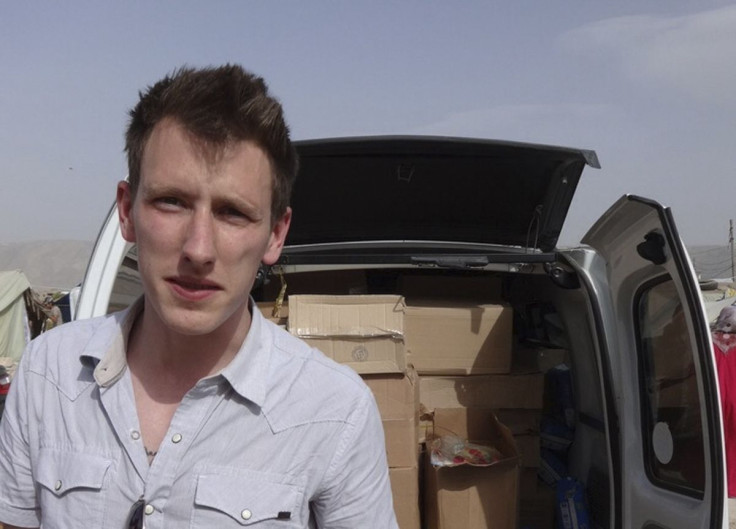US Hostage Negotiation Policy: After Peter Kassig Beheading, Will It Change?

As the Obama administration rethinks its policy on hostage cases, a third American, Peter Kassig, was executed on video by the Islamic militant group formerly known as ISIS this week. The long-standing U.S. policy of not negotiating with terrorists is unlikely to change, but the review may lead to better coordination among the federal agencies that deal with hostage situations and keeping the families of captives more informed about how the government is handling their kin’s cases, experts said.
“Every time you flip the policy between not negotiating and paying ransom, you raise the incentive to find more hostages. This is a very grim business,” said Anthony Cordesman of the Center for Strategic and International Studies, a nonpartisan think tank based in Washington. “The problem is the Islamic State is only one of many such movements and the precedents you set are never one hostage against one threat.”
A review of the government’s policy on hostage situations, which doesn’t include just the ISIS cases, was prompted “as a result of the increased frequency of hostage-taking of Americans overseas and the recognition of the dynamic threat posed by specific terrorist groups,” Christine Wormuth, the undersecretary of defense, wrote in a letter received last week by U.S. Rep. Duncan Hunter, R-Calif., and published Monday by the Daily Beast. The examination of the policy will focus on “family engagement, intelligence collection and diplomatic engagement policies,” she wrote. The letter was dated as received by Hunter Nov. 11, but it’s unclear when the review began.
Dan Mahaffee, director of policy for the Center for the Study of the President & Congress, a nonpartisan Washington think tank, said agency communication needs to be improved both within the U.S., where a number of agencies may be involved in hostage cases, and between U.S. intelligence agencies and their foreign counterparts in countries like Turkey, Jordan and Saudi Arabia, which have more human intelligence on ISIS than the U.S. has.
“There’s been a concern how you coordinate between Defense, State, FBI, the intelligence community,” Mahaffee said. And ISIS is “operating out of such a war-ravaged area” in Syria that it makes intelligence gathering difficult for the U.S.
Part of the problem is the FBI has had more experience in hostage negotiations than the CIA or the Department of Defense, which recently gained that experience with the emergence of Al Qaeda in the 1990s, according to Matthew Schmidt, a professor of national security and political science at the University of New Haven in Connecticut. And the FBI, which couldn’t legally communicate with the CIA until the Patriot Act went into effect shortly after the Sept. 11, 2001, terrorist attacks, didn’t have a presence in countries like Yemen until 20 years ago.
Another aspect of the policy to which Wormuth alluded in her letter is how U.S. officials communicate with the families of U.S. hostages. The families of slain journalists James Foley and Steven Sotloff said their country didn’t do enough to free the men from ISIS. Foley’s family also claimed that officials threatened to prosecute them if they paid the $132 million ransom requested by ISIS. Obama reportedly told the Foley family about the failed attempt to rescue the journalist after Foley’s mother vented her anger at him.
“It’s a difficult balancing act for the government,” Schmidt said, between finding a way to keep families more involved in the process and giving away too much information that may compromise the hostage. Schmidt said Obama may ask officials to give families a sense of what the government is doing because “this is a president who has a strong pastoral side.”
It’s unclear if the U.S. is reconsidering its stance on paying for hostages, as is the case with some European governments. But to say the U.S. doesn’t negotiate with terrorists isn’t accurate. The government negotiated a prisoner swap for American POW Bowe Bergdahl with the Taliban despite the U.S. calling the Afghanistan group a terrorist organization. Negotiations have also taken place in other cases as a means to gather intelligence and as a stalling tactic.
“Whenever you say you’ll never negotiate with terrorists, you always do it,” Cordesman said.
ISIS is believed to have at least one more American hostage, a 26-year-old female aid worker. The fact that the hostage is a woman represents a turning point for the group because ISIS has yet to behead a Western female captive. Whether ISIS shows mercy to the woman or morally justifies her execution for being a non-Muslim remains to be seen, but the group may face a growing backlash if she’s beheaded or, if she isn't, may lose legitimacy among supporters for not backing up its brutal reputation, Schmidt said.
Even if the policy is changed, ransom probably isn’t ISIS’ main goal in taking Americans hostage. The gruesome beheading videos are ways for ISIS to get volunteers and funding from sympathizers of the group, experts said.
“These hostage videos and these executions are powerful weapons in the hands of these terrorist groups,” Mahaffee said.
© Copyright IBTimes 2024. All rights reserved.






















